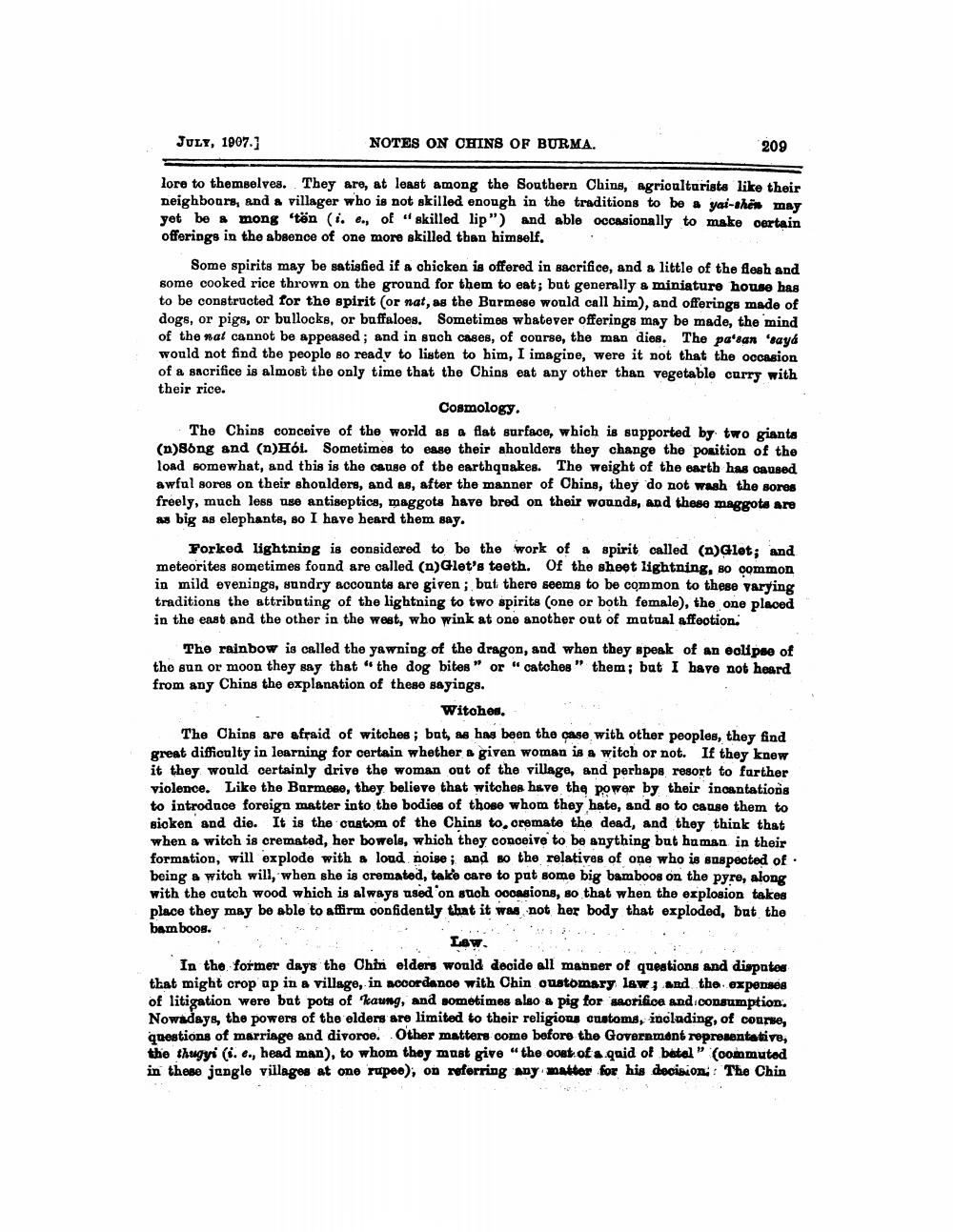________________
JULY, 1907.1
NOTES ON OHINS OF BURMA.
209
lore to themselves. They are, at least among the Southern Chins, agriculturists like their neighbours, and a villager who is not skilled enough in the traditions to be a yai-thän may yet be a mong 'tën (i, e., of skilled lip") and able occasionally to make certain offerings in the absence of one more skilled than himself,
Some spirits may be satisfied if a chicken is offered in sacrifice, and a little of the flesh and some cooked rice thrown on the ground for them to eat; but generally & miniature house has to be constructed for the spirit (or nat, as the Burmese would call him), and offerings made of dogs, or pigs, or bullocks, or buffaloes. Sometimes whatever offerings may be made, the mind of the nat cannot be appeased ; and in such cases, of course, the man dies. The pa'san 'saya would not find the peoplo so ready to listen to him, I imagine, were it not that the occasion of a sacrifice is almost the only time that the Chins eat any other than vegetable curry with their rice.
Cosmology. The Chins conceive of the world as a flat surface, which is supported by two giants (n)8ong and (n)Hói. Sometimes to ease their shoulders they change the position of the load somewhat, and this is the cause of tbe earthquakes. The weight of the earth has caused awful sores on their shoulders, and as, after the manner of Chins, they do not wash the sores freely, much less use antiseptics, maggots have bred on their wounds, and these maggots are as big as elephants, so I have heard them say.
Forked lightning is considered to be the work of a spirit called (n)Glet; and meteorites sometimes found are called (n) Glet's teeth. Of the sheet lightning, so common in mild evenings, sundry accounts are given; but there seems to be common to these varying traditions the attributing of the lightning to two spirits (one or both female), the one placed in the east and the other in the west, who wink at one another out of mutual effection.
The rainbow is called the yawning of the dragon, and when they speak of an eolipse of the sun or moon they say that "the dog bites" or "catches" them; bat I have not heard from any Chins the explanation of these sayings.
Witches.The Chins are afraid of witches; bat, as has been the case with other peoples, they find great difficulty in learning for certain whether a given woman is a witch or not. If they knew it they would certainly drive the woman out of the village, and perhaps resort to further violence. Like the Barmore, they believe that witches have the power by their incantations to introdace foreign matter into the bodies of those whom they hate, and so to cause them to sicken and die. It is the cuatom of the Chins to, cremate the dead, and they think that when a witch is cremated, her bowels, which they conceive to be anything but human in their formation, will explode with a loud noise ; and so the relatives of one who is snspected of being a witch will, when she is cremated, take care to pat some big bamboos on the pyre, along with the cutch wood which is always used on such occasions, so that when the explosion takes place they may be able to affirm confidently that it was not her body that exploded, but the bamboos. "
Law In the former days the Chini elders would decide all manner of questions and disputes that might crop ap in a village, in accordance with Chin oustomary lew; and the expenses of litigation were but pots of 'kaung, and sometimes also a pig for sacrifice and consumption. Nowadays, the powers of the elders are limited to their religious customs, including, of course, questions of marriage and divoroe. Other matters come before the Government representative, the thugyi (i. e., head man), to whom they must give the cost of sqaid of batol" (commuted in these jungle villages at one rupoo), on referring any matter for his decision. The Chin




